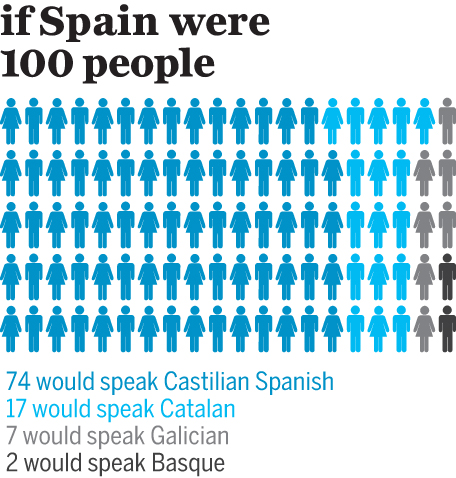Spain Today
Although you may not notice it as a visitor – this is Spain, after all, and its streets and bars are as full as ever – Spain is experiencing a time of profound economic crisis. As if that weren't enough, Catalonia wants to secede. Amid all the gloom, however, Spaniards cling to the hope that the country may have hit rock bottom and is once again on the rise.
Economic Crisis
Six years after Spain's economic crisis took hold in late 2008, the country is still reeling. Unemployment, which had dropped as low as 6% as Spain enjoyed 16 consecutive years of growth, now sits stubbornly above 26%, which equates to six million people. The International Monetary Fund (IMF) says that it could be a further five years before that figure falls below 25%. Suicide rates are on the rise, Spain’s young professionals are fleeing the country in unprecedented numbers and Oxfam recently predicted that a staggering 18 million Spaniards – 40% of the population – are at risk of social marginalisation within the next decade. And if all of this sounds bad, it's nothing compared to the catastrophic youth unemployment rates which recently topped 57.7%. Old-timers you speak to can't remember a time this bad, with businesses closing their doors forever, including many that weathered civil war and dictatorship down through the decades. And the government's punishing austerity drive is hardly improving the mood of Spaniards.
Signs of Hope?
These things are always easier to quantify in hindsight than they are at the time, but there are small signs that Spain's economy is recovering, albeit very slowly. After five years of contracting, the economy has begun to grow – yes, it may be at a snail's pace, and yes, it may take another decade to return to the growth rates of the pre-crisis boom years. But economists at Spain's largest banks have predicted that the economy may grow by almost 1% in 2014. Talk to business owners and many will tell you that an imperceptible shift occurred late in 2013. As one restaurant owner told us, 'people started going out to eat again. Maybe everyone just reached a point where they just threw up their hands and said, enough! Whatever the reason, there has been a change, even if it is a small one.’ At the very least, the worst seems to have passed. Long may it continue.
A New Politics
One of the most visible responses of Spaniards to the crisis has been to get organised. On 15 May 2011, the indignados (those who are indignant) took over the iconic Plaza de la Puerta del Sol in the centre of Madrid in a peaceful sit-in protest. Their popularity maintained by social-media networks, they stayed for months, the forerunner to numerous such movements around the world, including Occupy Wall Street and its offshoots. Driven by dissatisfaction with Spain's major political parties – the Popular Party government is already on the nose due to a major corruption scandal, while the still-disgraced Socialists appear unelectable in the short term having presided over the onset of Spain's catastrophic economic collapse – the 15-M movement (as they are known) has set up social and political grass-roots networks across the country. These community-based networks provide social welfare, prevent the evictions of those unable to pay their mortgages, and agitate for reforms to laws that require defaulting mortgage holders to hand over their homes and continue paying off their mortgage. No-one quite knows where it will all lead, but many Spaniards are hopeful of what may lie ahead.
Catalan Independence?
More than any other country in continental Europe, Spain often seems at risk of falling apart. For almost four decades, the Basque terrorist group ETA waged a low-level but violent struggle for independence. ETA is now a spent force, but now, it seems, Catalonia wants to leave the Spanish fold. Angered by what it considers to be its unfair shouldering of the economic burden during Spain's economic crisis, Catalonia announced that a referendum on independence would take place on 9 November 2014. Unlike in the UK where Scotland is being allowed to decide its own future, Spain's national government has denounced the plan as illegal and has vowed not to let the referendum go ahead. The only certain outcome for now appears to be an increasingly strident war of words between the national government and the restive region.
Best on Film
Jamón, jamón (1992) Dark comedy that brought Penélope Cruz and Javier Bardem to prominence.
Todo sobre mi madre (1999) Classic Pedro Almódovar romp through sex and death.
Mar adentro (2004) Alejandro Amenabar's study of a Galician quadriplegic.
Volver (2006) Almódovar's lush and offbeat portrait of a Spanish family in crisis.
Alatriste (2006) War and betrayal pursue a Spanish musketeer in this 17th-century epic.
Best in Print
A Late Dinner: Discovering the Food of Spain (Paul Richardson) Erudite journey through Spain's fascinating culinary culture.
A Handbook for Travellers (Richard Ford) This 1845 classic is witty, informative and downright rude.
The Train in Spain (Christopher Howse) Amusing yet insightful reflections from a veteran Spain-watcher.
The New Spaniards (John Hooper) A journey through three decades (until 2006) of democratic Spain.
Don Quixote (Miguel de Cervantes) Spain's best-known novel remains a classic journey through inland Spain.



Area
505,370 sq km
Population
46.61 million
GDP Per Capita
US$30,100
Annual Inflation
1.8%
Unemployment
26.3%
Population Below Poverty Line
21.1%